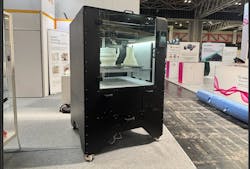Pam Pro Equipped with a real-time monitoring camera, this Pollen AM fused-granulate-fabrication (FGF) pellet printer is made for fully automated, full-production printing of all flexible materials. It boasts an intuitive touch screen, automated calibration, streamlined material loading and integrated artificial intelligence (AI) diagnostics. It also is appropriate for large-part prototyping and can be adapted to run two extruders at once.
What’s new? The printer. The first 50 Pam Pro printers are scheduled for delivery between September and December.
Benefits Ease of use, efficiency and speed. Compared to Pollen AM’s Pam o2 printer, the Pam Pro is bigger, faster and easier to use. Also, it’s been optimized for low waste and energy efficiency.
Pollen AM Inc., Ivry-sur-Seine, France, 33-158-462052, www.pollen.am
Vital Statistics
|
Dimensions of printer |
About 44.2 inches by 45.9 inches |
|
Height of printer |
About 73 inches |
|
Printer weight |
About 727.5 pounds |
|
Print volume |
About 26.8 inches by 26.8 inches by 19.7 inches |
|
Range of sizes for the extrusion head size |
0.25mm to 2.5mm |
|
Maximum extrusion temperature |
572 degrees Fahrenheit |
|
Maximum print bed temperature |
302 degrees Fahrenheit |
|
Maximum extrusion speed |
About 19.7 inches per second |
|
Materials that the printer can use |
Polylactic acid (PLA), thermoplastic elastomer (TPE), thermoplastic PU (TPU), PP, polyamide (PA) and butenediol vinyl alcohol (BVOH) |
About the Author
Karen Hanna
Senior Staff Reporter
Senior Staff Reporter Karen Hanna covers injection molding, molds and tooling, processors, workforce and other topics, and writes features including In Other Words and Problem Solved for Plastics Machinery & Manufacturing, Plastics Recycling and The Journal of Blow Molding. She has more than 15 years of experience in daily and magazine journalism.
